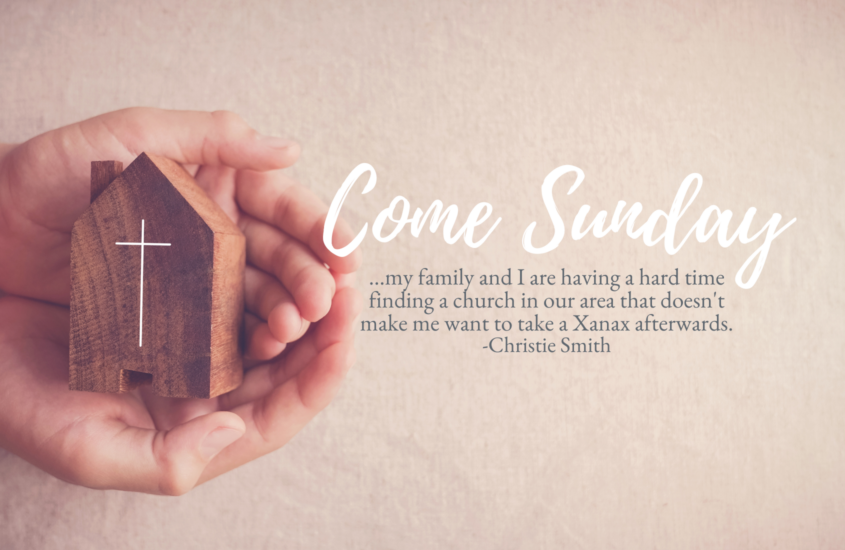Come Sunday
Christie Smith |
Let’s play a game of Where Am I?
My family and I have just pulled up to a commercial building that looks like it might have been an old K-Mart. We get out of our car and walk in the double doors, I feel oddly like I should be picking up a gallon of milk or some bread but that is not why we came here. As we enter we notice tables lining the walls in the foyer (which was probably where the popcorn machine and .25c kiddie rides used to be during the K-Mart years) a few have computers on them. The tables are covered in black table cloths with bright green letters that spell, “Engage!” and “Celebrate!”. The flooring is Pergo in a greyish, grainy wood. People are walking around, all of them seem to know everyone and exactly where to go. My family and I walk uncertainly through a sort of divider into a much larger room. There is a stage at the far end. How far away, I don’t quite know because the walls, ceiling, and stage are painted black. Rows of chairs that look to be of the easy removal type are lined in neat rows leading up to the stage. Just as I begin to get my bearings the music starts and I can no longer hear anything my husband and children have to say. Oh, how nice…they are handing out ear plugs. That will be helpful. The room has gone almost completely black except for neon stage lighting. And is that fog enveloping the musicians?
Have you guessed where I am yet? No, it’s not and indie concert downtown. It’s not a coffee shop evening event. Come Sunday morning (morning for Pete’s sake!), this is what you will find in most Western Protestant churches across America. And we wonder why Christians are just as frazzled as the rest of humanity. This is the expected, sensory overloaded, extroverted, if-you-don’t-like-it-there-is-the-door experience most of us are met with when attending church in America. Well, guess what? I don’t like it. And, I am not alone.
Recently, on Instagram, I talked about this subject as my family and I are having a hard time finding a church in our area that doesn’t make me want to take a Xanax afterwards. I was actually surprised to find how not alone I truly am. People who usually don’t interact with me in direct messaging reached out to say that they too are tired of modern Christian churches, with a big thrust of that exhaustion centering on modern worship, or what I like to call “Getting Peppy for Jesus.” I can see why evangelicals are immigrating to the older denominations in droves. We don’t want to get peppy for Jesus at 9:00 in the morning. We want to be peaceful with Jesus. We are tired. The world is so loud. We crave peace. We don’t want musical manipulation to create a mood or simulated intimacy. We want authentic corporate worship. Simple voices. Theologically rich lyrics, non-overbearing instrumental accompaniment. Less electric, more organic. No need for earplugs, thank you.
Have you ever wondered what would happen during a morning worship service if the electricity went out? Would we even know what to do? Is God present if we aren’t reaching sounds over 70 decibels (the level that permanent ear damage can occur)? I suppose I have an iron in the fire here as a person with vestibular issues, church has become a very uncomfortable and often physically painful place for me. I don’t think it needs to be that way. Indeed, I don’t believe it was ever meant to be that way.
This crazy drive for extroverted, overstimulating worship bleeds into other areas of the church as well. Children and youth ministries have no space for those that are not uber-outgoing and full of pep. I have talked with parents of children with sensory issues or autism that find church incredibly difficult even though they truly want to attend. This should not be so.
I am old enough (forty-four to be exact) to remember the before. The Before was a time when we sang songs out of a book bound in fabric and turned paper pages. The before was when all age groups came together to sings songs of our faith that had in many cases, endured for centuries. The before was little old ladies warbling out song specials on Sunday nights that the younger ones giggled at but the older ones cried while listening to the wisdom of the words sung by those whose faith had been hard won and battle worn. This was before the focus groups and church marketing teams told us that we had to become relevant. Remember, we were told that we had to be seeker friendly and appeal to the masses with music that mimicked the culture at large. It didn’t matter that we had literally a thousand years of beautiful, traditional church music to draw from. It didn’t matter that not everyone was onboard. This was the way! We were going to win back the culture by being just. like. it. As we know, this hasn’t panned out as promised. Western churches are not growing. Western churches are dying. Check the stats, its depressing to say the least. Yet, can we truly be surprised? We are not offering anything different than they can find outside the old K-Mart’s glass, double doors.
Isn’t it interesting how we honor other cultures ancient traditions and elders, but not our own? Why is that the case in Western Protestantism? Why do we feel the need to measure success by focus groups, charts and graphs? Why do we have to holler and yell? If we take a look at the world around us, what do we see? Homesteading movements, back to basics, sustainable living, real food, the importance of community and fellowship. People are craving traditions, could it be we are also craving the very same things in our churches? Could it be possible that we don’t need a fresh new wind igniting growth and enthusiasm in our churches? Is it possible that what we truly need more than a coffee shop aesthetic or indie rock band worship is to draw from the deep, ancient wells of our past, of tradition? Could we rediscover a time when it meant something to be the people of God, set apart, holy, and dearly loved?






